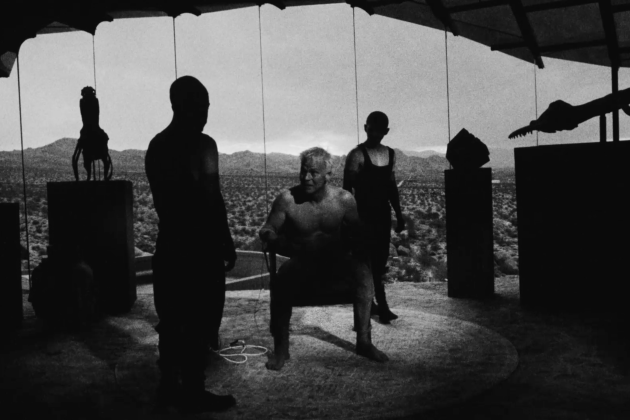‘Divinity’ Review: Stephen Dorff Engineers a Hardbodied Future

The future looks more purgatorial than paradisiacal in “Divinity,” Eddie Alcazar’s second feature as writer-director. Like the first, 2018’s “Perfect,” this is a cryptic sci-fi body horror allegory where undeniably arresting aesthetics are nonetheless more a symptom of shallow lookism-based values than the intended critique. Stephen Dorff plays a wealthy recluse peddling the titular mystery serum, which promises eternal youth — though, naturally, there may be drawbacks. This invention attracts attention not just from consumers, but from apparent space aliens who arrive to halt its disturbance of the natural order.
Those looking for midnight-movie eccentricity will find much to enjoy in the black-and-white film’s mix of the trippy, queasy and erotic. But as before, the effortfully quirky elements don’t really add up to a cogent whole, resulting in something a mite too reflective of its creator’s background in commercials and game design — a rarefied, stimulating surface without depth. (Trivia note: Elon Musk is among those thanked in the closing credits.)
More from Variety
Utopia, Sumerian Buy Stephen Dorff-Led Sundance Sci-Fi Thriller 'Divinity' (EXCLUSIVE)
'The Price We Pay' Review: Emile Hirsch and Stephen Dorff Get a Grisly Surprise at an Isolated Ranch
In flashbacks, Scott Bakula plays Sterling Pierce, a scientist whose chemical experiments were still very much in progress at the time of his premature death. Son Jaxxon (Dorff) has taken that incomplete intel to manufacture and market “Divinity,” a liquid administered by eyedrop from a perfume-type bottle. It bestows a kind of immortality that heightens physical perfection, but as yet does nothing to retard the mind’s aging process, or expand the intellect. This very commercial application, promoted in oft-glimpsed advertisements (amongst other parodic TV clips), is probably not at all what Jaxxon’s idealistic late father intended for his life’s work.
Still, it has clearly served Junior well, as he lives in a striking, expansive abode nestled in a rocky desert landscape, his non-mercantile needs tended to by Lynx (former adult film star Emily Willis). Indeed, it is their noisy coitus which prevents his noticing a security breach to the gated compound. Suddenly they are confronted by lookalike “brothers” (Moises Arias, Jason Genao) who seem to have arrived here from somewhere off-planet. Jaxxon is taken hostage, then force-fed an IV excess of Divinity for his crimes against the cosmos. This ultimately turns him into a roid-raging monster with Hercules’ body but the Elephant Man’s noggin.
All of this is as murky in narrative terms as it is sharp in visual ones, thanks to arresting contributions from cinematographer Danny Hiele, production designer Paul Rice and other key collaborators. (The original score by DJ Muggs and Dean Hurley soon grows more conventional than this project needs, however.) Also involved in the not-entirely-there plot are Karrueche Tran as an apparent sex worker making a house call, who becomes an ally to the interstellar siblings; four-time Mr. Universe Michael O’Hearn as a particularly body-beautiful devotee of Divinity; and Bella Thorne as leader to a small army of lookalike Amazonian women in leotards existing mostly in some other dimension.
Despite the implied disapproval of engineered physical perfection, Alcazar seems to do more ogling than anything else at the frequently nude or near-nude specimens on display. When Jaxxon’s clients arrive for his birthday party (not noticing that he’s bound and gagged downstairs), they all seem to be fitness models, the scene playing like a softcore fantasy-slash-music video. While the movie isn’t humorless — an increasingly manic Dorff in particular seems to treat his role as a goof — we’re taken aback when it culminates in a deliberately cheesy, Ray Harryhausen-style stop motion battle (animated by Misha Klein), because there’s been little prior indication of a camp sensibility at work.
You certainly can’t say Alcazar doesn’t have a unique sensibility of his own, however private — even if it requires the patronage of Steven Soderbergh (also executive producer on “Perfect”) and resources fairly ample for a vision not much more scrutable than “Eraserhead” or “Tetsuo: The Iron Man.” Coming off a bit like a sexed-up offspring of those two films, “Divinity” is less repellent than the director’s first feature, but again leaves a queasy aftertaste of comingled voyeurism and affectation. Rather like the results generated by its titular substance, this movie has looks to die for, but whatever is on its mind feels at once obscure and unappealing.
Best of Variety
Sign up for Variety’s Newsletter. For the latest news, follow us on Facebook, Twitter, and Instagram.

 Yahoo News
Yahoo News 